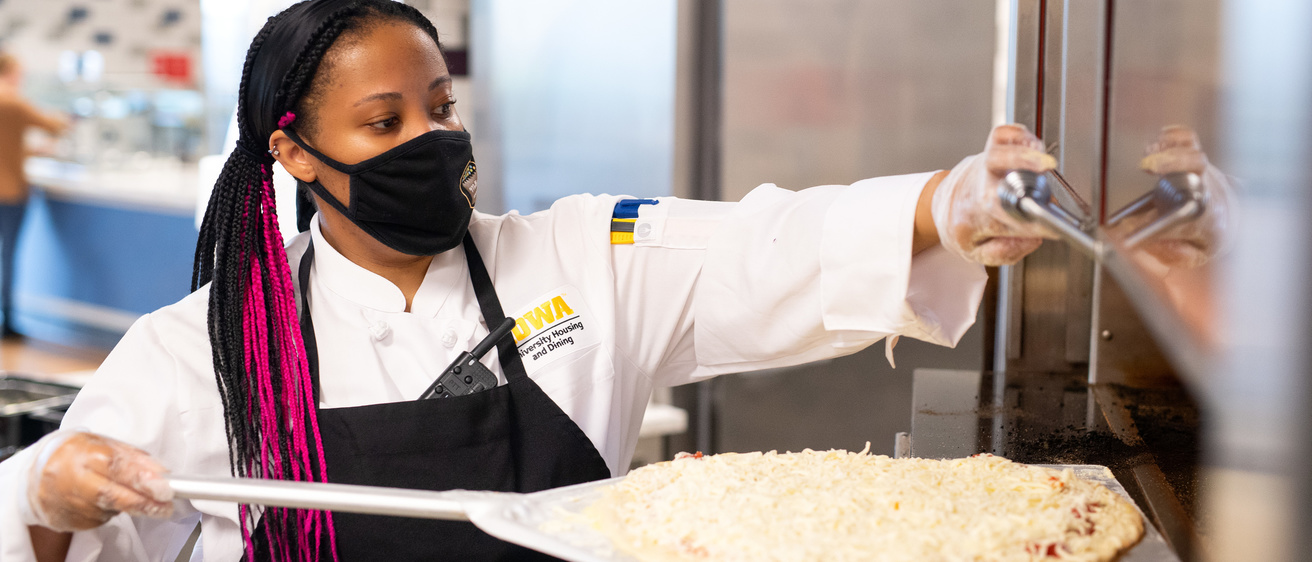As the first year of the P3 Merit Experience Pilot Project comes to an end, pilot project coordinator Steven Anderson reflects on what the pilot has accomplished so far and where it will go in years two and three.
In support of the University of Iowa Strategic Plan 2022-2027, University Human Resources is working to improve the experience of Merit staff so they can thrive and grow in their careers at Iowa. Merit staff are critical to every aspect of the university's mission, from feeding and housing students, to caring for university grounds and facilities, ensuring high quality patient care, and everything in between.
"It's been wonderful collaborating with the departments participating in the pilot. Throughout this process they have been so invested and engaged with the project," Anderson says. "I've been able to meet some really fun people and I've enjoyed working with these groups that I wasn't as familiar with and learning what they do."
What is the goal of the P3 Merit Experience Pilot Project?
Anderson: The overarching goal of the pilot is retention – how can we retain employees and reduce turnover. They go hand in hand. With that goal in mind, and based on feedback from Merit staff, we decided on the pilot's four key priorities: orientation and onboarding, supervisor training, peer mentoring, and career pathways.
Who is participating in the pilot?
The pilot consists of more than 100 Merit staff members and their supervisors from the College of Dentistry, Office of Animal Resources (OAR), and University Housing and Dining in the Division of Student Life. We're working with employees who sterilize dental equipment, cooks from all three campus dining halls, and animal caretakers from OAR.
Tell us about the peer mentor program.
The majority of my time in the first year has been spent developing and implementing the peer mentor program. We now have 12 peer mentors in place: six in the Office of Animal Resources and six in University Housing and Dining.
When a new cook is hired in Burge Market Place, for example, they are partnered with a peer mentor in their first week. The peer mentor comes alongside them and helps guide them through onboarding, transitions them into their new role, and welcomes them as part of the team. For the first couple of weeks, it's expected that the peer mentor will check in with the new employee almost daily. Then after that, they may get into a routine where they check in once a week – a pulse check, if you will.
None of these departments have had a peer mentor program before, so it was a new concept that we started from scratch. It was really exciting to develop the expectations, job description for the mentors, what the program is going to look like, etc.
What will the supervisor training look like?
I'm partnering with Organizational Effectiveness to develop the supervisor training. They will be a huge help with this because that's their expertise.
In July, we'll have our first in-person class bringing together the supervisors from all three departments in the pilot. We're bringing them together to have a training course specifically designed for them. I sent out surveys to gauge their highest priority needs and areas where they could benefit from additional training. We're designing the topics for the course around their feedback.
I plan to offer a class every six months throughout the life of the pilot. We're going to offer our first session this summer and then we'll offer the second class in January. A year from now, we'll offer our third in-person class.
What else are you working on?
I'm developing a checklist for supervisors that should be helpful during the onboarding process. I want supervisors to use the checklist to map out their responsibilities before a new employee starts, as well as what they need to do on Day 1, Week 1, Month 1. I think it would also be helpful for supervisors to understand what resources are provided by University Human Resources, their local HR rep, etc. Strengthening the onboarding process is critical to ensuring a positive start at the university.
Career pathways will also be an interesting part of this pilot. It's a Year 2 initiative for the Merit Experience pilot. We're just in the early stages of developing the scope of career pathways and its goals.
A theme from focus groups is that people find it difficult to advance in their careers, so there's been a committee collecting research and data around career pathways.
What's next?
Year 2 of the pilot will consist of implementing the onboarding and career pathways elements that we've been working on and assessing what's already been implemented. We want to collect feedback and data so that we can measure our impact and make adjustments as needed.
In Year 3 we'll continue the assessment and determine what we can scale university-wide. What did we learn? What's scalable?
We're excited to have these initiatives come to life over the next two years and see how they improve the work experience for our Merit staff.
